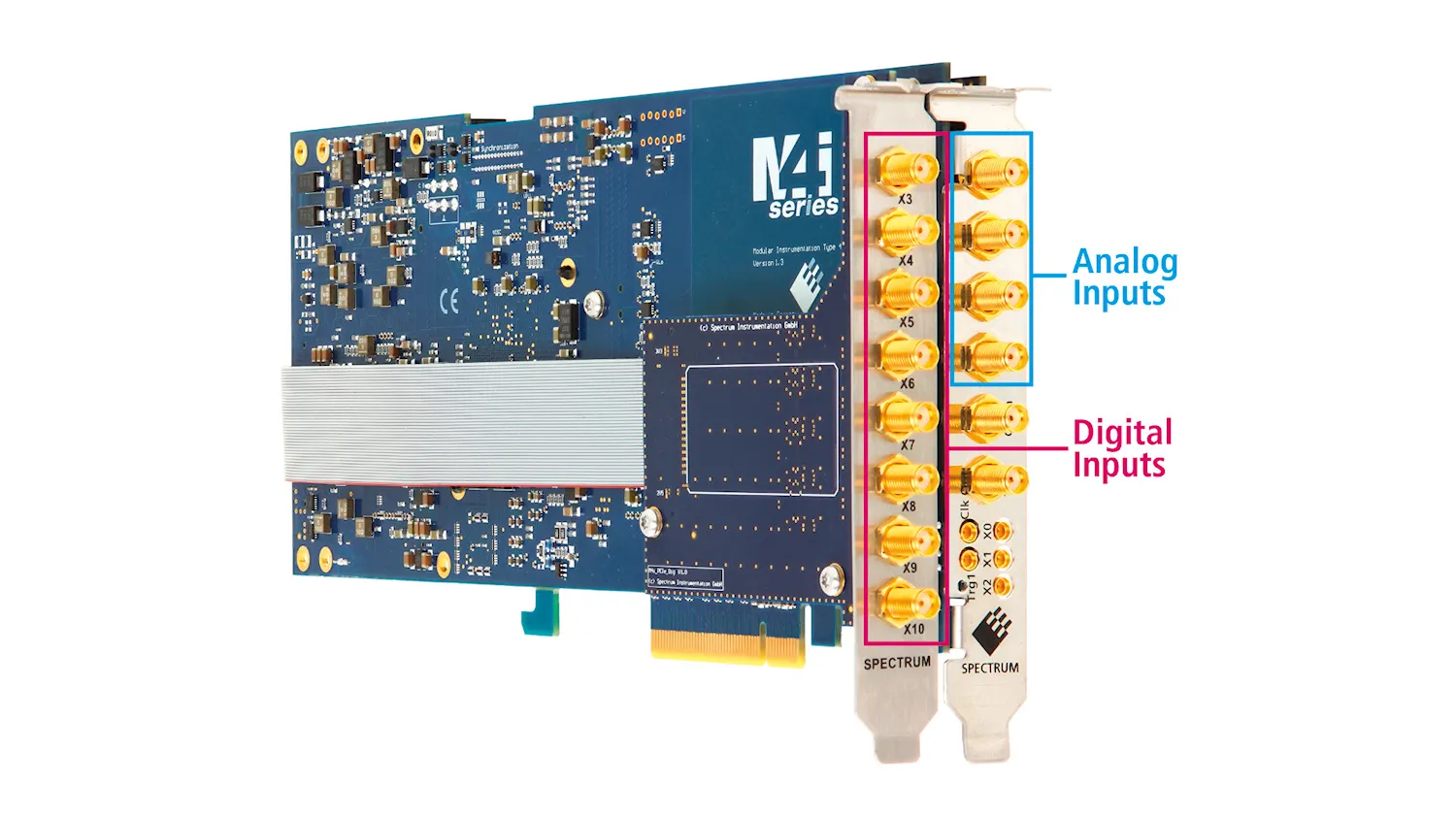
Fast PCIe Digitizers get 8 additional Digital Inouts
Spectrum Instrumentation has announced a new digital input option (M4i.44xx-DigSMA) for its popular high-speed and high-resolution series of PCIe digitizers. The option consists of an additional module that sits beside the existing digitizer card to provide 8 additional digital input lines.
The digital input module shares a common clock and trigger with the base card so that both the digital and analog inputs are fully synchronous. This makes the combination ideal for a wide variety of mixed signal testing applications. The option is available for all digitizer models of the "44"-series with up to 500 MS/s and two or four analog inputs. More analog channels can also be acquired by linking up to eight digitizers together with Spectrum's unique Star-Hub clock and trigger distribution system.
Match the digitizer to your application
The Spectrum M4i.44xx series of PCIe digitizer cards consists of eight different models. Users can select from versions that have either two or four analog channels and sampling rates of 180 or 250 MS/s, with 16-bit resolution, or higher speeds of 400 or 500 MS/s, with 14-bit resolution. The digitizer cards of the "44" series are fully equipped with extensive analog signal conditioning (6 input ranges, selectable input impedance, offset, etc.) and advanced triggering capabilities. The acquired data can be stored in a generous 2 GSamples of on-board memory or transferred to a PC in a variety of memory efficient read-out modes, including FIFO streaming, at rates up to 3.4 GB/s.
The cards are also packed with features to make them easy to integrate into any test setup. For example, they have additional front panel connections that include two external trigger inputs, an external clock reference input, clock output and three general purpose I/O lines that are available for asynchronous I/O operations. They come complete with software as well as all the tools necessary to work in virtually any system; whether it be embedded in an automated testing rig for electronic components or utilized as the key data acquisition device in science, communications, power, aerospace or medical applications.
Flexible Digital Inputs
The new M4i.44xx-DigSMA digital input option has a separate PCIe faceplate, occupying an additional PCIe slot, with 8x SMA type connector. Designed for versatility, each input has an impedance of 10 kOhms (to 3.3 V). This allows the inputs to handle 3.3 V LVTTL signals with input voltage levels between -0.5 V and +4.0 V. The digital input bandwidth is 125 MHz and software selection enables both synchronous and asynchronous acquisition modes.
When using the digital input option, the digital data is stored inside the analog samples by reducing a channel's resolution. This allows phase synchronization of both the analog and digital signals, as the one-bit digital signals are placed in the high order bits of the analog waveforms. As an example, if eight digital channels are in use, then the resolution of the analog channels would be reduced from 16 to 14 bits and two of the digital signals would be appended to each analog channel of a four-channel digitizer.
Add more channels with Star-Hub
For applications that require more channels, Spectrum enables multiple M4i.44xx series cards to be connected together with its Star-Hub system. Star-Hub permits a maximum of eight cards to all share a common clock and trigger. In this way, larger systems can easily be created by just adding more cards. For instance, by simply connecting together three M4i.4451-x8 digitizers, two with the M4i.44xx-DigSMA digital option and one with the star-hub option, a single system can be made that has 12 analog and 16 digital channels. Add more cards and add more channels!
Easy software control
All Spectrum digitizers come complete with software drivers that allow fully customized setups that can generate perfectly matching mixed-mode testing solutions. The digitizers, and the digital input option, are fully supported by the complete Spectrum software development kit (SDK) which includes programming using C++, C#, VB.NET, Python, JAVA, LabVIEW or MATLAB. The SDK is included as standard with every unit along with a base version of Spectrum's own software, SBench 6. This program lets users control all the modes and settings of the hardware via a straightforward, easy-to-use interface providing a simple tool for basic digitizer setup and test.
For more demanding applications, that may require data analysis and documentation, Spectrum also has available its SBench 6 Professional software. This powerful software extends the capabilities of the base version with additional features such as FFT analysis, analog and digital waveform display modes, XY display, a function interpreter, additional parameter measurements, export into ASCII, Wave, MATLAB, comment functions (for annotating signals or displays) and even a report and printout function.
The M4i.44xx series digitizers with the M4i. 44xx-DigSMA option are available with immediate delivery and come with Spectrum's industry leading, 5-year product warranty as standard.